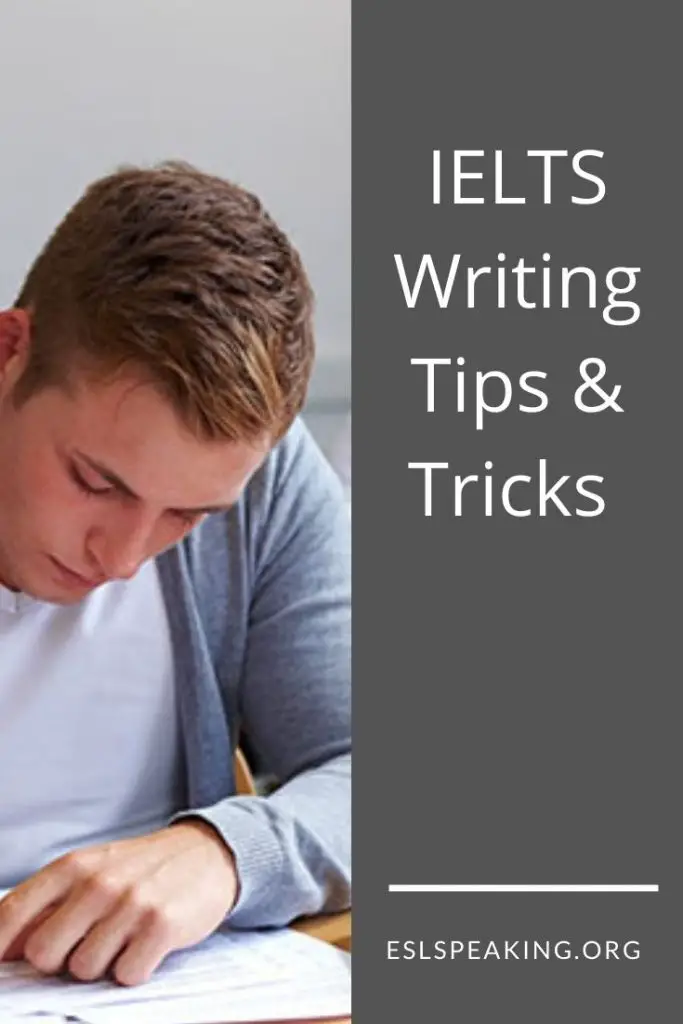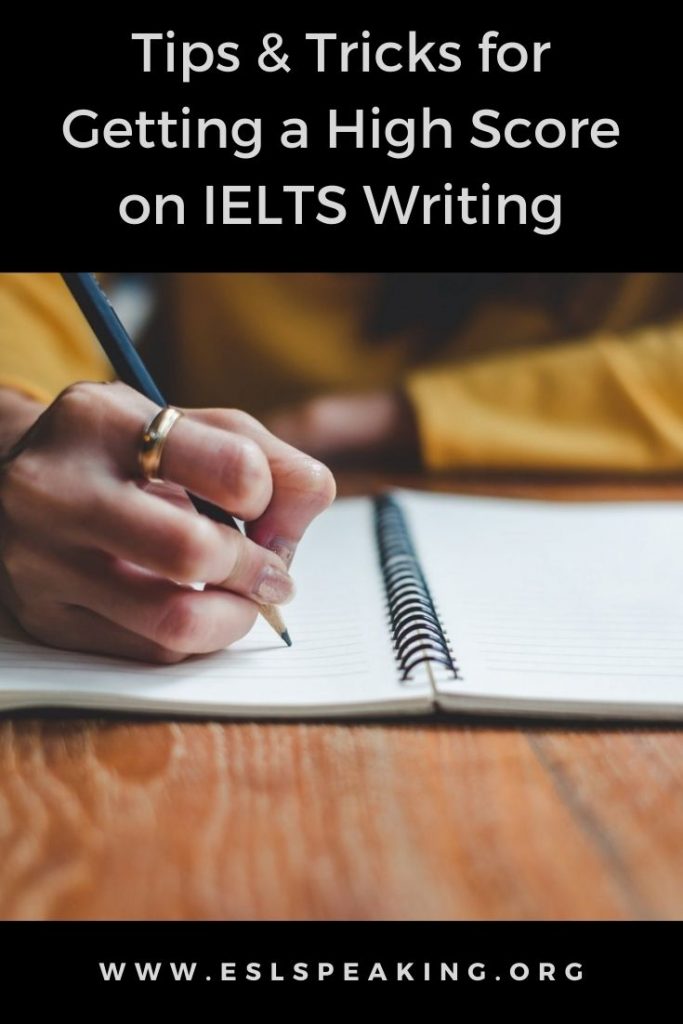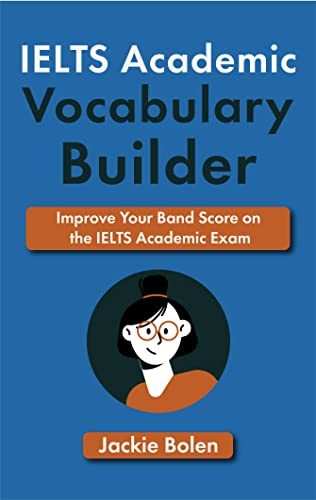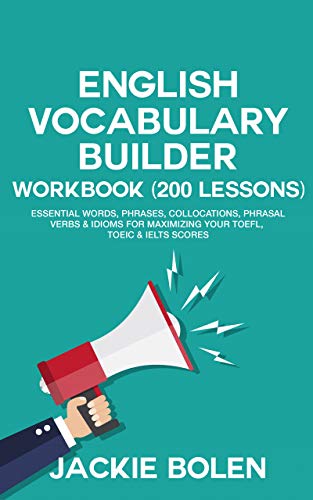If you want to get a higher score on the IELTS writing test, either the academic or general version, you’re in the right place. Keep on reading for these IELTS writing tips that help you get a higher band score.

Tips for IELTS writing
IELTS Writing Tips: Taking the Test
Here are some tips and tricks for IELTS writing to help you do your best on this exam.
Read the Question Carefully
Read the question carefully. Cover all the points that it asks you to. If you have time in the end, go back and double-check this.
For example, a question might ask you to talk about the pros and cons of something. If you only cover the pros but not the cons, you’ll lose points.
Tip for IELTS Writing: Minimum Word Count
For task 1, you must write more than 150 words. For task 2, the minimum is 250 words. Get into the habit of writing at least this number of words during your practice exams so you’ll get an idea of how long that is. Use your own words when answering questions. Words copied from the question will not count in this number.
Is there a Maximum Word Count?
There is no maximum word count for the IELTS writing exam. However, there is a time limit so it’s not possible to write a huge number of words. In addition, you won’t get “bonus” points for more words. It’s best to write a small amount over the minimum amount and try to do this perfectly.
If you write too many words, you’re likely to make more mistakes. You’ll also have less time to check what you’ve written.
For task 1, write between 160 and 200 words. For task 2, aim for 260-300 words.
- Amazon Kindle Edition
- Bolen, Jackie (Author)
- English (Publication Language)
- 148 Pages - 11/22/2020 (Publication Date)
Use Sentences and Paragraphs
One of the most important IELTS writing test tips is to use sentences. Do NOT use bullet points or lists. Write in full sentences.
And then organize these sentences into paragraphs. Each paragraph should have 3-5 sentences, covering a single idea. This is very important for task 2. Each paragraph has only 1 main idea. This simple thing will help you score more highly on this exam.
Be sure to link paragraphs together. For example, “I’ve just talked about _____, now I’m going to discuss _____.”
Shorter Sentences = Okay
Use a mix of short and medium-length sentences. Although it may be tempting to write very long sentences, it can be difficult to control the grammar in them. They also make it difficult to maintain coherence.
Remember: Write things accurately. Write simple things perfectly. This will help you get the highest score possible.
- Amazon Kindle Edition
- Bolen, Jackie (Author)
- English (Publication Language)
- 286 Pages - 04/06/2023 (Publication Date)
Stop Writing when the Person Tells you to Stop!
When the examiner tells you to stop writing, put your pen or pencil down. If you write even one more word after they tell you to stop, you will get a zero on the exam.
IELTS Writing Tip: Know Where the Clock Is
You aren’t allowed to bring a watch or cellphone into the exam with you. During the IELTS Writing exam, timing is very important. Be sure you know where the clock is so you can keep track of the time.
Task 2 is worth double what task 1 is. Be sure to leave enough time for task 2.
No Dictionaries for IELTS Writing
You aren’t allowed to use a dictionary for IELTS writing. Be sure to practice without one.
There are No “Right” or “Wrong” Answers
You are being graded on your writing ability, not whether or not you argued something from a specific point of view. The most important thing is how well you report information and express ideas.
It’s best to write about things you know well and can explain clearly. Don’t worry if it’s the strongest argument for an essay topic. Choose something you can write clearly about. This is the most important thing.
IELTS Writing Part 2: Plan Your Answer
For part two of the exam, you’ll have to write an essay in both the general and academic versions. Be sure to spend a few minutes making an outline before you start writing. This will help keep the essay organized and coherent. Use this structure
- Introduction (1 paragraph)
- Ideas to support the argument (1/paragraph)
- Conclusion (1 paragraph)
Part 2 Timing
For part 2, you’ll get 40 minutes. Use the first 5 minutes to plan your essay. Then, write for 30 minutes. Use the last 5 minutes to check over your answer and correct any errors.
It’s Impossible to Memorize an Answer
Don’t waste your time memorizing a model answer. It will be very obvious to the examiner that your answer doesn’t match the question and you will get a very low score.
Tip for IELTS Writing: British vs American Spelling
Don’t worry about this. Both kinds of spelling are fine and will be marked as correct.
Avoid Informal Language
Use more formal language. The only situation in which it’s okay to be informal is in some part 1 (general) questions. But, not always. Only in some cases.
- Amazon Kindle Edition
- Bolen, Jackie (Author)
- English (Publication Language)
- 790 Pages - 03/04/2021 (Publication Date)
IELTS General vs Academic
There are a few key differences between the IELTS writing exam for the general and academic versions. Here’s the information you need about that.
What’s the same?
There are a few similarities between the two versions.
- Both versions have two tasks.
- Task 1 is 33% of the final score.
- Task 2 is 67% of the final score.
- The time limit is the same for both.
IELTS Academic Writing
In task 1, you’ll have to select and compare information from a graph, diagram or chart. In your introduction, don’t copy words from the question. Don’t worry about interpreting or giving reasons for the data. Just state facts.
IELTS Academic Writing Task 1: Use a Standard Structure
In order to get the highest score, use this structure for task 1:
- Introduction (describe what the graph or chart shows).
- Overview (state main trends).
- Specific details (provide data).
Task 2 is an essay on a general topic. You should write formally and not include a lot of personal response.
IELTS Gen,eral Writing
In task 1, you’ll have to write a letter requesting information or explaining a situation. It may be personal, semi-formal or formal in style.
Task 2 requires an essay on a general topic. You can include some personal response for the general version. However, organize the essay in the same way that you would for an academic one:
- Introduction
- Ideas/reasons to support your opinion (1 paragraph/idea)
- Conclusion
Most people consider the general writing exam to be easier than the academic one.

IELTS tips and tricks for writing
Writing Tips for IELTS: Preparation
There are a number of ways to prepare for the IELTS writing exam. Some ideas are to take a class, do practice exams and have a teacher grade them, learn some key vocabulary words and pay attention to how to structure answers. Here are some recommendations for IELTS writing practice exams.
IELTS Writing Practice Tests
Check out: British Council vs IDP IELTS.
General Writing Skills, Vocabulary and Grammar are Important
It can be difficult to get an 8 or 9 on the IELTS writing test unless you have a solid grasp of writing grammatically correct sentences. These sentences should contain a mix of vocabulary, at a higher level. In other words, you should use precise, instead of very general words for things.
It’s certainly useful to do practice IELTS writing exams. They’re ideal for understanding the format and timing of the test. However, if your writing skills are not good, it’ll be difficult to get a high score. Consider taking a general English class, or getting a tutor to help you with writing skills.
Here are some ways to practice English writing:
- Amazon Kindle Edition
- Bolen, Jackie (Author)
- English (Publication Language)
- 55 Pages - 03/03/2017 (Publication Date)
IELTS Writing Tips for Test Day
Here are some IELTS writing tips and tricks for the day of the test.
Get Enough Sleep and Eat Before the Exam
The IELTS reading, writing and IELTS listening portions of the exam take almost 3 hours. Sometimes you’ll do your IELTS speaking exam on the same day, or it may be scheduled for a different time.
Be sure to get enough sleep the night before the exam. And then have a meal before the test so you’re not hungry. You’ll be able to do your best if you’re not tired or hungry!
Clothes
One of the best IELTS writing tips is to wear comfortable clothes. Your appearance doesn’t matter for this exam! Wear something that you feel comfortable in and be sure to bring an extra sweater in case the exam room is cold.
Water
Bring a water bottle with you to the exam in case you get thirsty. You are allowed to bring it into the room with you.
Arrive Early
Check and see what the policy is for the center you’re taking the test at. If you are late, you won’t be allowed to enter the room and will have to reschedule your exam.

IELTS writing test tips
IELTS Writing Scoring
There are four ways that writing is evaluated for this exam. Each section is worth 25%
- Task achievement (appropriate tone, purpose, word count, answered the question, etc.)
- Coherence (does it make sense) and cohesion (is the writing linked together)
- Lexical resources (vocabulary)
- Grammar
You can score from a band 1 (writing nothing!) to a band 9 (fluent). Prepare for the IELTS Exam
- Amazon Kindle Edition
- Bolen, Jackie (Author)
- English (Publication Language)
- 70 Pages - 01/01/2021 (Publication Date)
One of the best ways to get a high score on the IELTS exam, especially writing and speaking is to learn more vocabulary. Check out this book on Amazon: English Collocations in Dialogue.
A collocation is a group of words that occurs together more frequently than by random chance. For example, idioms or expressions. Knowing some of them is the key to getting a good score on the lexical resource (vocabulary) section of the IELTS exam.
Check out the book today:
IELTS Writing FAQs
Check out these writing IELTS tips and answers to the most popular questions.
How can I get an 8 in IELTS writing?
It’s possible to get an 8 in IELTS writing if you’re already quite good at writing in English. Besides that, pay attention to word counts, use an organized structure and use your time wisely. Use simple grammar perfectly and be sure to answer the questions fully.
How can I pass IELTS writing?
To pass IELTS writing, make sure to do the following:
- Pay attention to time and don’t spend more than 20 minutes on task 1.
- Be sure to check your writing.
- Answer the questions fully.
- Pay attention to word counts.
- Plan the essay before you start writing.
Why is IELTS writing so difficult?
The main reason that IELTS writing is so difficult is because of the time limit. Writing an essay in 40 minutes is quite challenging. That’s why it’s essential to do practice exams and get in the habit of writing more quickly.
Are there specific writing formats for each task?
Yes, Task 1 might involve formal/semi-formal writing, and Task 2 generally requires a more discursive essay style.
Are spelling and grammar important in this writing exam?
Yes, correct spelling and grammar contribute to your overall writing score.
Can you use bullet points in your essays?
It’s recommended to use full sentences and paragraphs rather than bullet points.
Are you penalized for going over the word limit?
Yes, writing significantly over the word limit may affect your score, as it could impact the quality and focus of your writing.
IELTS Writing Tips: Join the Conversation
Do you have any IELTS writing test tips? Leave a comment below and let us know. We’d love to hear from you.
Last update on 2025-06-24 / Affiliate links / Images from Amazon Product Advertising API











Leave a Reply